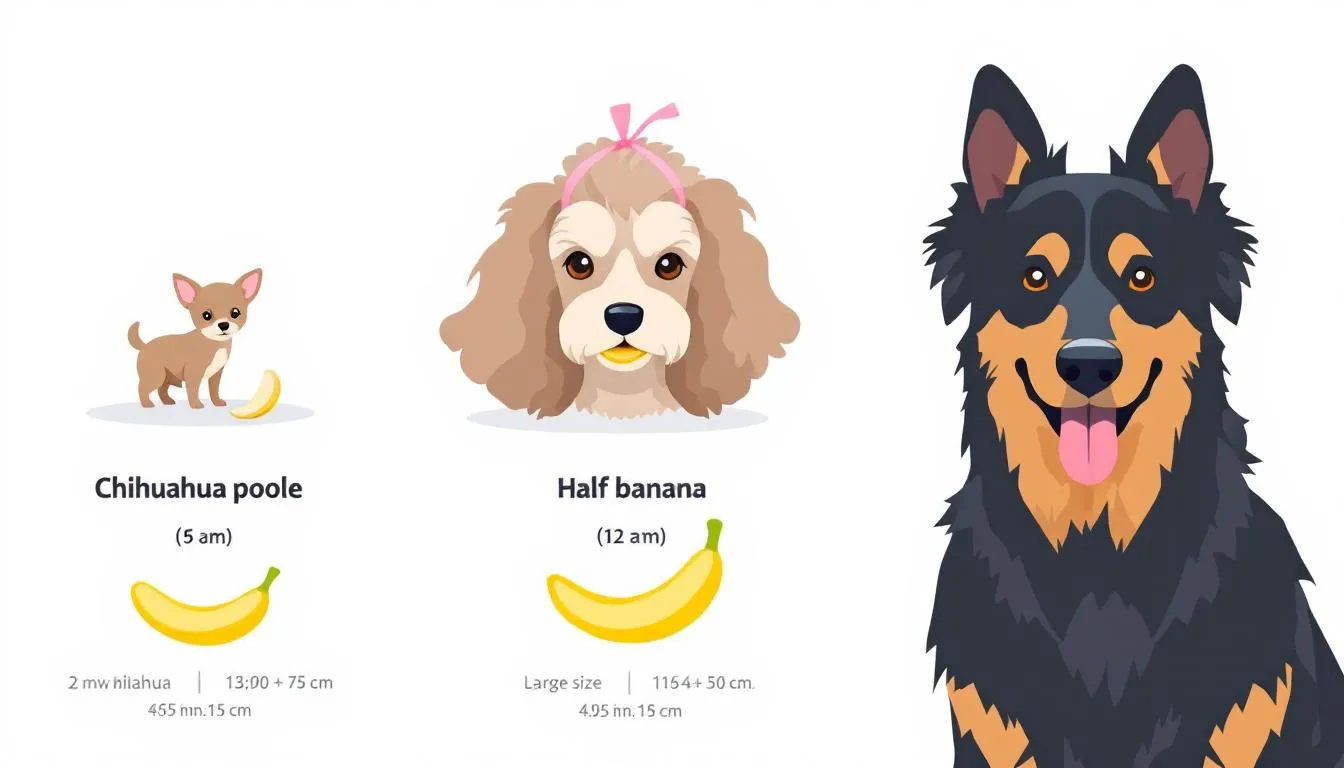Introduction to Bananas in a Dog’s Diet
Bananas are a nutritious and tasty treat that many dog owners love to share with their pets. Yes, dogs can eat bananas, and when offered in small quantities, they can be a healthy snack packed with essential nutrients. Bananas are rich in potassium, vitamin C, and fiber, all of which support your dog’s overall health. The natural sweetness of bananas makes them an appealing option for dogs, and their soft texture is easy for most dogs to eat. When introducing bananas into your dog’s diet, start with just a slice or two to see how your dog reacts. Bananas can be served in a variety of dog-friendly recipes—try offering frozen banana pieces as a refreshing treat, mashing them into your dog’s regular food, or baking them into a simple dog-friendly cake. Remember, while bananas are good for dogs, moderation is key to prevent any upset stomachs. By offering bananas as an occasional treat, you can add variety and nutrition to your dog’s diet in a safe and enjoyable way.
Key Takeaways
- Bananas are safe for dogs when given in moderation as an occasional treat
- Dogs should only eat the banana flesh - never the peel, which can cause digestive blockages
- Limit banana portions to 10% of your dog's daily calories to prevent weight gain from natural sugars
- Always introduce bananas gradually and watch for allergic reactions or digestive upset
- Consult your veterinarian before feeding bananas to diabetic or overweight dogs
Bananas are safe for dogs when given in moderation as an occasional treat
Dogs should only eat the banana flesh - never the peel, which can cause digestive blockages
Limit banana portions to 10% of your dog's daily calories to prevent weight gain from natural sugars
Always introduce bananas gradually and watch for allergic reactions or digestive upset
Consult your veterinarian before feeding bananas to diabetic or overweight dogs
You’re enjoying a banana and your dog gives you those irresistible eyes. Before you share, you’re smart to wonder: should dogs eat bananas? The short answer brings good news—dogs can eat bananas safely when you follow some simple guidelines. Unlike grapes or chocolate, bananas pose no toxicity risk to your furry friend. But like any treat, the key lies in how much banana you offer and how you prepare it.
This guide covers everything you need to know about feeding bananas to dogs, from nutritional benefits to potential risks. You’ll learn proper portion sizes, safe preparation methods, and when to skip bananas altogether. Let’s dive into the facts that keep your dog healthy and happy.


Can Dogs Safely Eat Bananas?
Yes, dogs can safely eat bananas as a healthy treat when given properly. Bananas are completely non-toxic to dogs and provide beneficial nutrients like potassium and vitamin B6. This puts them in the safe category alongside apples and blueberries, far from dangerous fruits like grapes—dogs should never eat grapes, as they can cause kidney failure.
Knowing what foods a dog can eat is important for every pet owner. Dogs can digest bananas thanks to their amylase enzyme production, which breaks down the starches and natural sugar content. This digestive capability developed through domestication, as their wolf ancestors rarely encountered sweet fruits. Modern dogs handle banana consumption well, making it a suitable tasty treat for most pets. The dog banana is a popular choice for a healthy snack, as long as it is fed in moderation and with attention to portion size.
The safety of bananas for dogs comes with important caveats. While the fruit flesh is perfectly safe, dogs should never eat banana peels, which can cause intestinal blockage. Additionally, the high sugar content means bananas work best as an occasional treat rather than a regular part of your dog's diet. Maintaining a balanced dog's diet is essential, so treats like bananas should only make up a small portion to avoid health issues.
Not all fruits share this safety profile. Many fruits and vegetables dogs can enjoy, but others like grapes, raisins, and cherries remain strictly off-limits. Bananas are good for dogs when you understand proper feeding practices and portion control.
Nutritional Benefits of Bananas for Dogs
Bananas pack impressive nutritional benefits that can complement your dog’s regular dog food. In addition to being a tasty snack, bananas offer several health benefits for dogs, such as supporting heart health, aiding digestion, and promoting muscle and bone development. A 100-gram serving contains approximately 358 mg of potassium, crucial for muscle function, heart health, and bone development. This mineral supports proper nerve transmission and helps maintain normal blood pressure in dogs.
Bananas are a nutritious treat, providing important nutrients that contribute to your dog’s overall well-being. Vitamin B6 in bananas promotes brain function and helps reduce inflammation throughout your dog’s body. This vitamin supports protein metabolism and red blood cell formation, contributing to overall energy levels. Meanwhile, bananas and other fruits provide vitamins C, which offer antioxidant benefits and immune system support, though dogs naturally produce their own vitamin C.
The fiber content aids digestion and can help with weight management when given appropriately. Bananas contain both soluble and insoluble fiber, which supports healthy gut bacteria and promotes regular bowel movements. However, too much banana can overwhelm your dog’s digestive system with excess fiber.
|
Nutrient |
Amount per 100g Banana |
Benefit for Dogs |
|---|---|---|
|
Potassium |
358 mg |
Muscle and heart function |
|
Vitamin B6 |
0.4 mg |
Brain health, metabolism |
|
Vitamins C |
8.7 mg |
Immune support, antioxidants |
|
Fiber |
2.6 g |
Digestive health |
|
Natural Sugar |
12 g |
Quick energy (requires moderation) |
Nutrient
Amount per 100g Banana
Benefit for Dogs
Potassium
358 mg
Muscle and heart function
Vitamin B6
0.4 mg
Brain health, metabolism
Vitamins C
8.7 mg
Immune support, antioxidants
Fiber
2.6 g
Digestive health
Natural Sugar
12 g
Quick energy (requires moderation)
Natural sugars provide quick energy but require careful moderation to prevent health issues. While these sugars can fuel active dogs, too much sugar leads to weight gain and dental problems. Bananas are a healthy alternative to processed snacks, offering nutritional benefits like fiber and vitamins, but their benefits work best when balanced against your dog’s complete nutritional needs from high-quality dog food.


Proper Portion Sizes for Different Dog Sizes
Getting portion sizes right prevents the problems that come with too much banana while ensuring your dog enjoys this healthy snack. The golden rule: treats should never exceed 10% of your dog’s daily calories, and bananas count toward this limit due to their natural sugar content. The appropriate banana portion depends on your dog's size and your dog's weight, as both factors influence how much banana is safe and healthy for your pet.
Extra-small dogs (under 10 lbs): Offer just 1-2 thin slices per serving, no more than once or twice weekly. Small dogs have tiny caloric needs, making even a few slices significant. A single medium banana contains about 105 calories—nearly 20% of a 10-pound dog’s daily caloric intake.
Small dogs (10-25 lbs): Give 2-3 small pieces, 2-3 times per week maximum. Cut these into quarter-sized portions to prevent choking hazards. Monitor your small dog closely for any signs of stomach upset, as smaller dogs often have more sensitive digestive systems.
Medium dogs (25-50 lbs): Offer 5-10 banana chips or quarter banana portions. These dogs can handle slightly larger servings, but daily banana treats still risk adding too many calories. Space servings throughout the week rather than giving multiple portions in one day.
Large dogs (50-75 lbs): Half a banana, 1-2 times per week maximum works well for larger breeds. Cut into manageable pieces to prevent gulping and potential choking. Even large dogs can experience digestive upset from too many bananas.
Extra-large dogs (over 75 lbs): Half to two-thirds of a banana occasionally fits their caloric needs. Giant breeds might seem capable of handling whole bananas, but moderation prevents digestive issues and maintains proper nutrition balance.
Always start with smaller portions when introducing bananas, regardless of your dog’s size. Watch how much banana your individual dog tolerates, as sensitivity varies between pets.
Feeding Bananas to Puppies
Feeding bananas to puppies can be a great way to introduce them to new flavors, but it’s important to proceed with extra care. Puppies have sensitive, developing digestive systems, so they should only eat bananas in very small amounts and as an occasional treat. When feeding bananas to your puppy, start with a tiny piece and watch closely for any signs of an upset stomach or allergic reaction. Puppies require a balanced diet to support their rapid growth, so bananas should never replace their regular puppy food. Instead, think of bananas as a special addition to their diet, not a staple. Always avoid giving banana peels to puppies, as these can cause dangerous intestinal blockages. By introducing bananas slowly and in moderation, you can safely let your puppy enjoy the benefits of this healthy fruit while supporting their overall development.


Potential Risks and When to Avoid Bananas
High sugar content poses the primary risk when dogs eat banana treats regularly. Too much sugar contributes to obesity, dental problems, and can cause dangerous blood sugar spikes. The sugar in ripe bananas can also leave residue on your dog's teeth, potentially increasing the risk of cavities. Dogs with diabetes should avoid bananas entirely, as the natural sugar concentration can disrupt insulin management and glucose control.
Overweight dogs may need to skip banana treats to maintain their calorie goals for healthy weight loss. Since bananas contain about 89 calories per 100 grams, they can quickly derail weight management efforts. Choose low calorie treat alternatives like cucumber slices or small pieces of green beans instead.
Excessive fiber from too many bananas can cause diarrhea, gas, or stomach upset in sensitive dogs. Too much banana can overwhelm your dog's digestive system, leading to issues like vomiting, diarrhea, or even bowel obstruction in rare cases. Some dogs experience the opposite problem—constipation from sudden fiber increases. Start with tiny portions to assess your dog’s tolerance before offering larger servings.
Food allergies to bananas remain rare but possible. Symptoms include itchy skin, chronic ear infections, vomiting, or changes in behavior. Any dog showing signs of allergic reaction should stop eating bananas immediately, and you should consult your veterinarian.
Puppies need extra caution with new foods like bananas. Their developing digestive systems handle changes poorly, and their smaller size means even tiny portions pack significant caloric impact. Wait until puppies reach at least 12 weeks old before introducing banana treats, and always consult your veterinarian first.
If your dog has eaten too much banana or has eaten banana peels, monitor for signs of choking, digestive blockage, or poisoning, and contact your veterinarian right away. Most dogs enjoy bananas without problems, but these risks remind us why moderation matters. When in doubt, stick to your dog’s regular, nutritionally complete dog food as their primary nutrition source.


Safe Preparation and Feeding Methods
Always remove the peel completely before offering banana to dogs. Banana peels aren’t toxic, but they’re tough, fibrous, and difficult to digest. Even small pieces can cause intestinal blockage, especially in smaller dogs. Letting dogs eat banana peels can lead to digestive issues and potential health risks due to pesticides and the risk of blockages. Make peeling bananas your first step every time.
Cut bananas into quarter-inch thick slices to prevent choking hazards. Larger pieces, especially if frozen, can get stuck in your dog’s throat or cause them to gulp without chewing, creating a serious choking hazard or even intestinal blockage. Proper sizing also helps with portion control—you can easily count out the right number of pieces for your dog’s size.
Mash bananas to hide medications or mix with regular dog food for dogs who need pill assistance. The soft texture and appealing taste make bananas excellent for concealing necessary medications. Just remember to account for the banana calories in your dog’s daily total. When feeding your dog banana treats, always ensure they are prepared safely and in appropriate amounts.
Freeze banana pieces in Kong toys for enrichment activities that provide mental stimulation. Frozen bananas become a longer-lasting treat that keeps dogs occupied while providing cooling relief on hot days. Cut pieces small enough to prevent choking when they thaw. Only feed your dog frozen banana in small, manageable pieces to avoid any risk.
Blend bananas with dog-safe yogurt (no xylitol or artificial sweeteners) for special refreshing treat occasions. Use plain, unsweetened yogurt and keep portions small. This creates a creamy texture many dogs love while adding beneficial probiotics.
Never feed banana bread, chips with additives, or commercial banana products to your dog. Letting dogs eat banana chips can be risky due to added sugar, salt, preservatives, and the potential choking hazard from hard pieces. These processed foods contain extra sugar, artificial sweeteners, chocolate, nuts, or other ingredients that are toxic to dogs. Stick to fresh, plain banana flesh for the safest option.


What to Do If Your Dog Eats Banana Peels
Banana peels aren’t toxic, but they can cause serious problems including intestinal blockage or upset stomach. The tough, fibrous material doesn’t break down easily in your dog’s digestive system, potentially creating obstructions that require emergency veterinary care.
Watch for blockage symptoms: vomiting, loss of appetite, lethargy, straining to defecate, or abdominal pain. These signs can appear within hours or take up to 48 hours to develop. Dogs may also show restlessness, excessive drooling, or difficulty maintaining normal posture.
Contact your veterinarian immediately if any blockage symptoms appear. Don’t wait to see if symptoms resolve on their own—intestinal blockages can become life-threatening quickly. Your vet may recommend inducing vomiting if the ingestion was recent, or they might suggest monitoring at home for mild cases.
Monitor your dog closely for 24-48 hours after peel ingestion, even if they seem fine initially. Keep a log of their eating, drinking, urination, and bowel movements. Any changes from normal patterns warrant veterinary consultation.
Banana peels may contain pesticides that are harmful to dogs, adding another reason to keep peels away from your pet. Even organic bananas can have residues that dogs shouldn’t consume. Prevention remains the best approach—always dispose of peels where curious dogs can’t reach them.
Emergency vet care may be needed for large peel consumption, especially in small dogs where even small pieces pose proportionally larger risks. Don’t hesitate to call your emergency veterinary clinic if you’re concerned about the amount consumed or your dog’s symptoms.
Signs of Banana Allergies in Dogs
Introduce bananas in very small amounts to test for reactions before offering larger portions. Start with just a slice the size of your fingernail and wait 24-48 hours to observe your dog’s response. This gradual approach helps identify sensitivity before it becomes a serious problem.
Watch for gastrointestinal symptoms: vomiting, diarrhea, or excessive gas appearing within hours of banana consumption. These digestive signs often appear first and may indicate your dog can’t properly process bananas. Mild symptoms might resolve quickly, but repeated occurrences suggest banana intolerance.
Monitor for skin reactions: itching, rashes, hot spots, or chronic ear infections developing after banana feeding. Food allergies often manifest through skin and ear conditions that worsen over time. Your dog might scratch more than usual, develop red patches, or show increased ear wax production.
Look for behavioral changes: lethargy, loss of appetite, restlessness, or general discomfort following banana treats. Dogs can’t tell us they feel unwell, so changes in normal behavior patterns provide important clues about food reactions.
Stop feeding bananas immediately if any allergic symptoms occur. Remove all banana-containing treats from your dog’s environment and return to their regular diet. Keep a detailed record of symptoms, timing, and severity to share with your veterinarian.
Consult your veterinarian for proper allergy testing and treatment options if you suspect banana allergies. They can perform specific tests to confirm food allergies and recommend alternative healthy treats that won’t trigger reactions. Professional guidance ensures you’re not unnecessarily restricting your dog’s diet.
Common Mistakes When Feeding Bananas
When it comes to feeding bananas to dogs, there are a few common mistakes that dog owners should avoid. One of the biggest errors is giving dogs too many bananas, which can lead to an upset stomach, diarrhea, or even weight gain due to the fruit’s natural sugar content. Another frequent mistake is forgetting to remove the banana peel—banana peels are difficult for dogs to digest and can cause intestinal blockages, especially in smaller dogs. Some owners also mistakenly offer banana bread or other baked goods containing bananas, not realizing that these often include ingredients like raisins or xylitol that are toxic to dogs. Additionally, introducing bananas too quickly or failing to monitor for allergic reactions can put your dog’s health at risk. To keep your dog safe, always feed bananas in moderation, remove the peel, avoid processed banana foods, and watch for any signs of digestive upset or allergies.
Banana Alternatives and What to Avoid
Safe alternatives to bananas include apple slices (without seeds), blueberries, watermelon flesh, and strawberries. These other fruits provide similar nutritional benefits with lower sugar content or different nutrient profiles. Apples offer fiber and vitamins with less natural sugar than bananas.
Blueberries pack antioxidants in tiny, portion-controlled packages perfect for training treats. Watermelon provides hydration and vitamins with minimal calories, making it ideal for overweight dogs. Always introduce any new foods gradually and in appropriate portions for your dog’s size.
Avoid banana bread containing raisins, xylitol, chocolate chips, or excessive sugar—all toxic to dogs. Even homemade banana bread typically contains too much sugar, butter, and other ingredients that don’t belong in your dog’s diet. The question “can dogs eat banana bread” has a clear answer: no.
Skip banana chips with preservatives, salt, or artificial sweeteners that can harm your dog’s health. Commercial banana chips often contain added oils, salt, and preservatives that provide no nutritional benefits and may cause digestive upset. Stick to fresh fruit for the healthiest option.
Never feed banana pudding due to high sugar content and potentially toxic ingredients like chocolate or artificial sweeteners. Many desserts contain xylitol, an artificial sweetener that’s extremely dangerous for dogs. When in doubt, keep human desserts away from your pet.
Dried bananas concentrate fiber and sugar, requiring extreme moderation if offered at all. The dehydration process removes water while concentrating everything else, making portion control even more critical. Fresh bananas remain the better choice for occasional treats.
Plantains can be safe when cooked plain, but avoid raw plantains or any prepared with seasonings, oils, or spices. Raw plantains are harder to digest and provide little benefit over regular bananas. Stick to foods specifically prepared for dogs when possible.
FAQ
Can puppies under 6 months eat bananas?
Yes, but in very small portions (half a slice) and only after consulting with your veterinarian about appropriate introduction timing. Puppies have developing digestive systems that may not handle new foods well. Wait until your puppy is eating solid food consistently before introducing any treats, including bananas.
How often can I give my dog bananas?
Limit banana treats to 2-3 times per week maximum, ensuring they don’t exceed 10% of your dog’s daily caloric intake. For most dogs, this means a few small pieces spread throughout the week rather than daily portions. Remember that all treats combined should stay within that 10% limit.
What should I do if my dog ate a whole banana including the peel?
Monitor for signs of intestinal blockage and contact your vet immediately if you notice vomiting, lethargy, or loss of appetite within 24 hours. The peel poses the greatest risk due to potential blockage. Keep detailed notes about your dog’s behavior, eating, and bathroom habits to report to your veterinarian.
Are frozen bananas safe for dogs?
Yes, small pieces of frozen banana can be a refreshing treat, but avoid giving whole frozen bananas due to choking and digestive risks. Frozen banana pieces work well in puzzle toys or as cooling treats on hot days. Always cut into appropriate sizes before freezing to prevent choking hazards.
Can bananas help with my dog’s constipation?
While bananas contain fiber, they’re not recommended as a treatment for digestive issues—consult your veterinarian for proper constipation remedies. Digestive problems need professional evaluation to determine the underlying cause and appropriate treatment. Your vet can recommend safe, effective solutions specific to your dog’s needs.
FAQ
Can puppies under 6 months eat bananas?
Yes, but in very small portions (half a slice) and only after consulting with your veterinarian about appropriate introduction timing. Puppies have developing digestive systems that may not handle new foods well. Wait until your puppy is eating solid food consistently before introducing any treats, including bananas.
How often can I give my dog bananas?
Limit banana treats to 2-3 times per week maximum, ensuring they don’t exceed 10% of your dog’s daily caloric intake. For most dogs, this means a few small pieces spread throughout the week rather than daily portions. Remember that all treats combined should stay within that 10% limit.
What should I do if my dog ate a whole banana including the peel?
Monitor for signs of intestinal blockage and contact your vet immediately if you notice vomiting, lethargy, or loss of appetite within 24 hours. The peel poses the greatest risk due to potential blockage. Keep detailed notes about your dog’s behavior, eating, and bathroom habits to report to your veterinarian.
Are frozen bananas safe for dogs?
Yes, small pieces of frozen banana can be a refreshing treat, but avoid giving whole frozen bananas due to choking and digestive risks. Frozen banana pieces work well in puzzle toys or as cooling treats on hot days. Always cut into appropriate sizes before freezing to prevent choking hazards.
Can bananas help with my dog’s constipation?
While bananas contain fiber, they’re not recommended as a treatment for digestive issues—consult your veterinarian for proper constipation remedies. Digestive problems need professional evaluation to determine the underlying cause and appropriate treatment. Your vet can recommend safe, effective solutions specific to your dog’s needs.
Conclusion on Dogs Can Eat Bananas
In summary, dogs can eat bananas and enjoy them as a tasty treat, but it’s important to do so with care and moderation. Bananas offer essential nutrients like potassium, vitamin C, and fiber, making them a healthy snack when fed properly. Dog owners should always introduce bananas gradually, remove the peel, and avoid giving their dogs banana bread or other foods with harmful ingredients. By paying attention to portion sizes and watching for any signs of upset stomach or allergic reactions, you can safely include bananas as an occasional treat in your dog’s diet. Remember, while bananas are good for dogs, they should never replace a balanced, nutrient-rich dog food. With the right approach, feeding bananas can be a fun and nutritious way to reward your furry friend.






